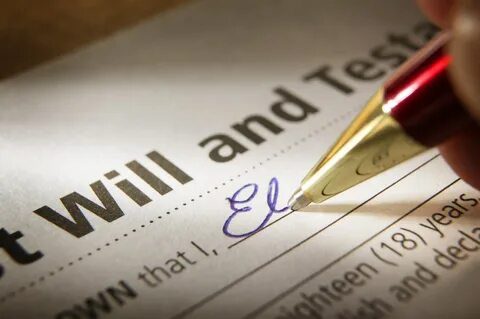Elements of a will: The scholars are unanimously agreed that the principle of the Elements of choice is permissibility, but it may be considered desirable, obligatory, hated and prohibited. The following is a detailed statement of the provisions with their cases:
Elements of a will
The will is what the enslaved person does in his life to have a benefit after his death the choice, which is to donate money or its value to other than the heirs after his death, such as presenting a specific capital, or a house, or a car, or otherwise, and the will was obligatory before the revelation of the verse of inheritance.
The choice is copied to the heir in the poetry of heritage, and the elements of a will work maybe for one of the relatives or others.
The will for non-relatives is permissible by the consensus of scholars; whether it is for a group of people, or a specific person, or for something that does not belong to relatives, such as building a mosque or digging a well, as for relatives without The heirs, the legacy is legitimate for them; For God Almighty says:
(كُتِبَ عَلَيْكُمْ إِذَا حَضَرَ أَحَدَكُمُ الْمَوْتُ إِن تَرَكَ خَيْرًا الْوَصِيَّةُ لِلْوَالِدَيْنِ وَالْأَقْرَبِينَ بِالْمَعْرُوفِ حَقًّا عَلَى الْمُتَّقِينَ)
As for the inheriting relatives, their share of the heirs is predetermined in the verses about inheritance, and it is not permissible to bequeath them to them, as the Messenger of God, may God’s prayers and peace be upon him, said:
(إنَّ اللَّهَ تبارَك وتعالى قد أعطى كلِّ ذي حقٍّ حقَّهُ فلا وصيَّةَ لوارثٍ)
The Elements of a will are required to be less than a third. If it is more than a third, or if the Elements of choice is for one of the heirs, this depends on the consent of the heirsز
Because they are the reason for preventing the execution of the Elements of a will, if they allow the increase, it is implemented, and what is considered by the permission of the heirs are the adults, but the fool and the insane have no right for his guardian to authorize the Elements of a will on his behalf; Because that is equivalent to a donation, and there is no donation of money from one who is not of sound mind.
The rule of the will

Elements of a will
Desirable will
And it is when the deceased bequeaths money to be spent on charitable causes and ways of benevolence until his reward reaches him after his death, and that is if he has a lot of money, and his heirs are wealthy, and it is what is approved and authorized by Sharia, taking into account that it does not exceed the limit of one-third of his money,
Obligatory will
It is the commandment with the rights and duties that he owes. He was negligent in performing them, whether these rights and responsibilities are related to the right of God Almighty, such as zakat he did not pay, or a pilgrimage he did not perform with his ability, or these rights and duties were related to the right of humans; Such as paying trusts, returning rights to their owners, paying debts, and making a bequest for relatives who are not heirs if they are poor and the testator is rich.
Hated will
And it is if the heirs are in need, and the testator does not have much money; it narrows them down.
Forbidden will
The endowment is prohibited if it exceeds one-third of the money. This is due to the prohibition of the Prophet – may God’s prayers and peace be upon him – from that, unless the heirs agree to it; Because this is equivalent to a waiver of their rights, and it is forbidden if it is for one of the heirs unless the rest of the heirs allow it as well. However, the testator must be keen that his will be within the limit of one-third, or less, even if the heirs allow it, so as not to be attached damage them.
Elements of a will

Elements of a will
They will consist of four pillars, and the following is a detailed statement:
- For a testator; And he is every free taxpayer, so the legacy of the insane, the lunatic, and the distinguished and indistinguishable boy is not valid. Nor with what is a sin: building churches or aiding in books specific to their religion.
- Recommended; If the beneficiary is a public authority, then he is required to be in obedience, even if the testator is a dhimmi, and it is permissible for a Muslim and a dhimmi will build and reconstruct mosques: such as the Al-Aqsa Mosque and the restoration of the graves of prophets, scholars, and the righteous, and everything that can be benefited from, or blessed, as well as can be The commandment to free the prisoners of the infidels from the hands of the Muslims, because the benefit is permissible from that.
- Recommended; It has several conditions: that it be intentional; That is, an asset, and unintentionally attached to what is forbidden to be acquired. Because it is, by default, to be transferable from one person to another, what is not acceptable to transfer, the Elements of a Willis are not valid: the limits and retribution, and they will not be good in the rights attached to the money.
- No more than a third of the money.
- To be the property of the testator; It is not permissible for him to bequeath what is owned by others.
- Formula; It consists of the offer and acceptance, and the offer is for the testator to say: I recommended such and such to him, or pay him after my death such-and-such, or he is for him after my death, and if he wrote his Elements of a will in writing and he intended it, his intention is valid without dispute, and if he is mute, his Elements of a Willis correct by pointing and writing.
Read More: Inheritance tax levels: What is their value?